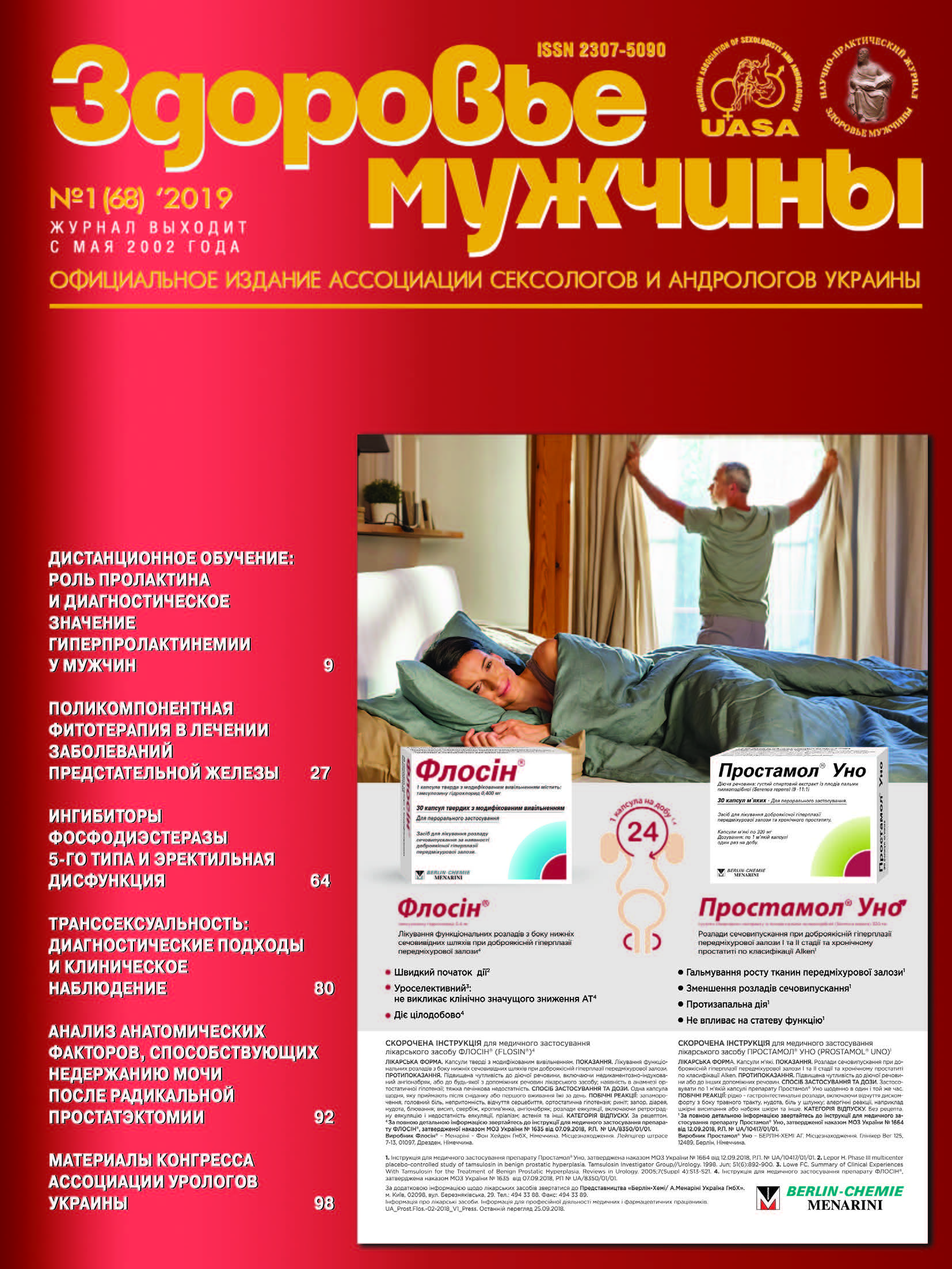Role and Place of Menopausal Hormone Therapy in Treatment of Symptoms of Lower Urinary Tracts in Women of 40+ Age
##plugins.themes.bootstrap3.article.main##
Abstract
The objective: to evaluate the results of a comparative analysis of the clinical efficacy of various compositions, combination and pharmacological effects of drugs (antispasmodic, hormones, of plant origin) for symptoms of the lower urinary tract in women in the premenopausal period.
Materials and methods. The efficacy of the treatment of 120 premenopausal women with symptoms of the lower urinary tract was studied. The complaints, uroflow metrics, sociological survey of results to identify the symptoms of menopausal syndrome by the MRS scale, as well as the level of anxiety by the S. Spielberg scale were evaluated as criteria for its assessment in the dynamics before and after 3, 6, 12 months. The data were statistically processed using Student’s and Fisher’s criteria.
Results. There have been revealed the frequency and nature of complaints in women aged 40 plus, manifested in the form of urinary disorders, gynecological symptoms of menopausal syndrome. The results of treatment with the use of monotherapy with mirabegron, as well as in combination with menopausal hormone therapy (MHT) and herbal medicine, have been studied. There has been proven clinical advantage in treating women with genitourethral syndrome, using a combination of systemic MHT and symptomatic.
Conclusions. Treatment of lower urinary tract symptoms in women of perimenopausal age with the presence of menopausal manifestations requires an integrated approach with the inclusion of systemic menopausal hormone therapy, among which objectively proven advantage of the drug, which includes levonorgestrel, as well as symptomatic therapy.##plugins.themes.bootstrap3.article.details##

This work is licensed under a Creative Commons Attribution 4.0 International License.
Authors retain the copyright and grant the journal the first publication of original scientific articles under the Creative Commons Attribution 4.0 International License, which allows others to distribute work with acknowledgment of authorship and first publication in this journal.
References
Калиниченко С.Ю. Влияние женской андрогенной недостаточности и ее коррекции на нарушение мочеиспускания у женщин в постменопаузе / С.Ю. Калиниченко, С.С. Апетов, Е.А. Греков, Ю.А. Тишова // Лечащий врач. – 2012. – № 3. – С. 20–24.
Калиниченко С.Ю. Роль тестостерона в женском организме. Общая и возрастная эндокринология тестостерона у женщин / С.Ю. Калиниченко, И.А. Тюзиков, Ю.А. Тишова, Л.О. Ворслов // Гинекология. Эндокринология. – 2015. – № 14 (115). – С. 59–64.
Неймарк А.И. Урогенитальные проявления климактерического синдрома, лечение / А.И. Немарк, М.В. Раздорская, Н.В. Шелковникова // Казанский медицинский журнал. – 2012. – Т. 93, № 2. – С. 208–211.
Нечипоренко А.Н. Урофлоурометрия в диагностике стресового недержания мочи у женщин / А.Н. Нечипоренко, М.В. Савицкий, Н.А. Нечипоренко // Медицинские новости. – 2016. – № 6. – С. 68–70.
Сухих Г.Т. Практические рекомендации по применению заместительной гормональной терапии у женщин в пери- и постменопаузе / Г.Т. Сухих, В.П. Сметник, Л.М. Ильина, С.В. Юренева [и др.]. – Ярославль: Литтера, 2009. – 249 с.
Тюзиков И.А. Дефицит андрогенов у женщин в урогинекологической практике: патофизиология, клинические «маски» и фармакотерапия с применением трансдермальных форм тестостерона / И.А. Тюзиков, С.Ю. Калиниченко, С.С. Апетов // Российский вестник акушера-гинеколога. – 2014. – № 1. – С. 33–43.
Хайдарова Ф.А. Тестостерон и качество жизни женщин / Ф.А. Хайдарова, С.С. Нигматова // Эндокринология. – 2012. – № 2 (42). – С. 137–142.
Davis S.R. Androgen therapy in women, beyond libido / S.R. Davis // Climacteric. – 2013. – N 16 (1). – P. 18–24.
Davis S.R. Efficacy and safety of testosterone in the management of hypoactive sexual desire disorder in postmenopausal women / S.R. Davis, G.D. Braunstein // J Sex Med. – 2012. – N 9 (4). – P. 1134–48.
Fernandez-Carvajal I. Lipid profile modifications in post-menopausal women treated with testosterone gel / I. Fernandez-Carvajal, H. Luz-Araujo, M. Guerra-Velazquez, E. Reyna-Villasmil [et al.] // Endocrin Nutr. – 2012. – N 59 (1). – P. 44–49.
Glaser R., Dimitrskakis C. Testosterone therapy in women: Myths and misconceptions. Maturitas 2013; pii: S0378 – 5122: 13:00012-1. doi:10.1016/j/maturalis. 2013.01.003.
Glaster R. Beneficial effects of testosterone therapyin women measured by the validated Menopause Rating Scale (MRS) / R. Glaster, A.E. York, C. Dimitrakakis // Maturitas. – 2015. – N 68 (4). – P. 355–361.
Maclaran K. The safety of postmenopausal testosterone therapy / K. Maclaran, N. Panay // Women’s Health. – 2012. – N 8 (3). – P. 263–75.
Wierman M.E. Androgen therapy in women: a reappraisal: an endocrine society clinical practice guideline / M.E. Wierman, W. Arlt, S.R. Davis [et al.] // J Clin Endocrinol Metab. – 2014. – N 99 (10). – P. 3489–3510.





